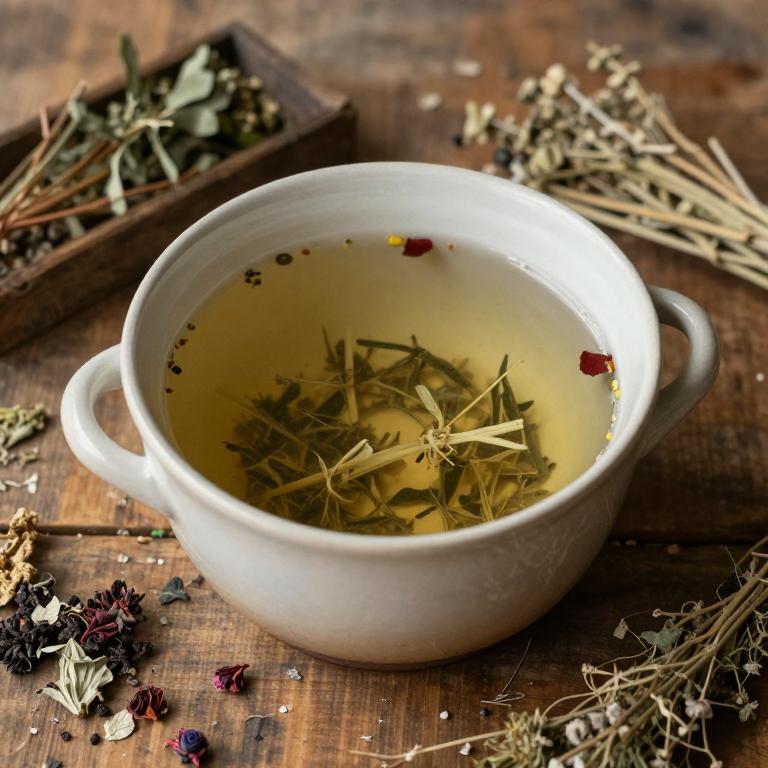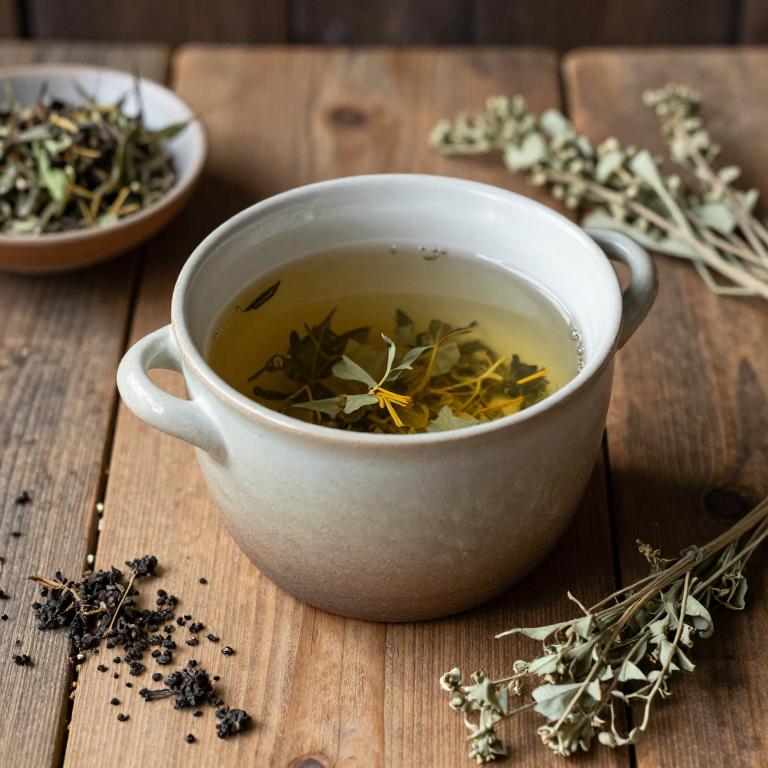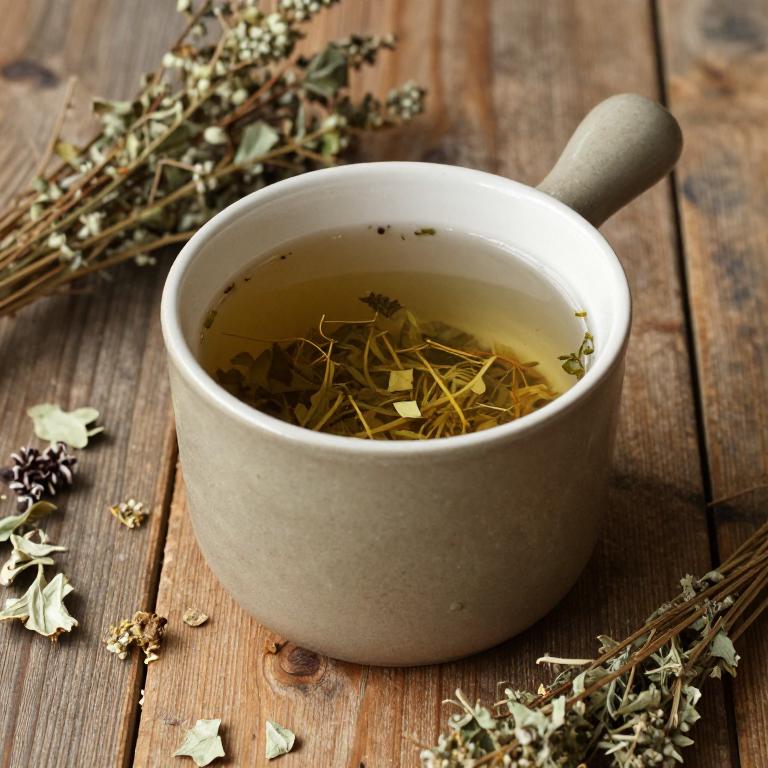10 Best Herbal Decoctions For Endometriosis

Herbal decoctions have gained attention as a complementary approach for managing endometriosis, often used alongside conventional medical treatments.
These decoctions typically include herbs such as chasteberry, ginger, and turmeric, which are believed to possess anti-inflammatory and hormone-regulating properties. They may help alleviate symptoms like pain and menstrual irregularities by supporting hormonal balance and reducing uterine inflammation. However, it is important to consult with a healthcare provider before using herbal remedies, as they can interact with medications and may not be suitable for everyone.
While some studies suggest potential benefits, more rigorous research is needed to fully understand their efficacy and safety in treating endometriosis.
Table of Contents
- 1. Chaste tree (Vitex agnus-castus)
- 2. Turmeric (Curcuma longa)
- 3. Black cohosh (Cimicifuga racemosa)
- 4. Stinging nettle (Urtica dioica)
- 5. Thistle (Silybum marianum)
- 6. Licorice (Glycyrrhiza glabra)
- 7. Echinacea (Echinacea purpurea)
- 8. Black cumin (Nigella sativa)
- 9. Tree peony (Paeonia suffruticosa)
- 10. Salvia (Salvia officinalis)
1. Chaste tree (Vitex agnus-castus)

Vitex agnus-castus, commonly known as chasteberry, has been traditionally used in herbal medicine to support hormonal balance, which may be beneficial for women with endometriosis.
Herbal decoctions made from the fruit of the Vitex agnus-castus plant are often prepared by simmering the dried berries in water, allowing the active compounds to be extracted for consumption. Some studies suggest that vitex may help regulate menstrual cycles and reduce symptoms associated with hormonal imbalances, which are often linked to endometriosis. While it is not a cure, vitex is sometimes used as a complementary therapy under the guidance of a healthcare provider.
However, more research is needed to fully understand its efficacy and safety for managing endometriosis.
2. Turmeric (Curcuma longa)

Curcuma longa, commonly known as turmeric, has been traditionally used in herbal medicine for its anti-inflammatory and antioxidant properties.
Herbal decoctions made from Curcuma longa roots are often prepared by simmering the dried rhizomes in water to extract the active compounds, particularly curcumin. These decoctions may help reduce inflammation and oxidative stress, which are implicated in the development and progression of endometriosis. Some studies suggest that curcumin can inhibit the growth of endometrial lesions and modulate hormonal pathways involved in the condition.
However, more clinical research is needed to fully understand its efficacy and optimal dosage for treating endometriosis.
3. Black cohosh (Cimicifuga racemosa)

Cimicifuga racemosa, commonly known as black cohosh, has been traditionally used in herbal medicine for its potential benefits in managing symptoms associated with endometriosis.
Herbal decoctions of Cimicifuga racemosa are often prepared by simmering the dried root in water to extract its active compounds, which may include triterpene glycosides and phenolic acids. These compounds are believed to have anti-inflammatory and analgesic properties that could help alleviate pain and reduce inflammation in endometriotic lesions. While some studies suggest that Cimicifuga racemosa may help regulate hormonal imbalances linked to endometriosis, more clinical research is needed to confirm its efficacy and safety.
As an alternative or complementary therapy, it should be used under the guidance of a qualified healthcare practitioner to ensure proper dosing and to avoid potential interactions with other medications.
4. Stinging nettle (Urtica dioica)

Urtica dioica, commonly known as stinging nettle, has been traditionally used in herbal medicine for its potential therapeutic effects.
Herbal decoctions made from the leaves and stems of Urtica dioica are believed to support hormonal balance and reduce inflammation, which may benefit women with endometriosis. These decoctions are often prepared by simmering the dried plant material in water for an extended period to extract its active compounds. Some studies suggest that nettle may help alleviate symptoms such as pain and heavy menstrual bleeding associated with endometriosis.
However, it is important to consult with a healthcare provider before using Urtica dioica as a treatment, as it may interact with other medications or have side effects.
5. Thistle (Silybum marianum)

Silybum marianum, commonly known as milk thistle, has been explored for its potential therapeutic effects in managing endometriosis through herbal decoctions.
The plant contains active compounds such as silymarin, which exhibit antioxidant, anti-inflammatory, and hepatoprotective properties. These properties may help reduce oxidative stress and inflammation, which are commonly associated with endometriosis progression. Some preliminary studies suggest that silybum marianum decoctions may support hormonal balance and alleviate symptoms like pain and menstrual irregularities.
However, more rigorous clinical trials are needed to confirm its efficacy and establish standardized dosing for endometriosis treatment.
6. Licorice (Glycyrrhiza glabra)

Glycyrrhiza glabra, commonly known as licorice root, has been traditionally used in herbal medicine for its anti-inflammatory and immune-modulating properties.
Herbal decoctions made from Glycyrrhiza glabra may help alleviate symptoms of endometriosis by reducing pelvic inflammation and hormonal imbalances associated with the condition. The active compounds in licorice, such as glycyrrhizin and flavonoids, have demonstrated potential in inhibiting the growth of endometrial lesions and modulating estrogen receptors. However, due to its potential to increase blood pressure and cause fluid retention, caution is advised when using licorice-based decoctions, especially in individuals with cardiovascular conditions.
While some studies suggest promising results, more clinical research is needed to fully establish its efficacy and safety in treating endometriosis.
7. Echinacea (Echinacea purpurea)

Echinacea purpurea, commonly known as purple coneflower, is a traditional herbal remedy that has been explored for its potential therapeutic effects in managing endometriosis.
While primarily known for its immune-boosting properties, some studies suggest that echinacea may possess anti-inflammatory and antioxidant properties that could help reduce the inflammation associated with endometriosis. Herbal decoctions made from echinacea roots and flowers are often prepared by simmering the plant parts in water, and they are sometimes used as complementary therapy alongside conventional treatments. However, more clinical research is needed to establish its efficacy and safety for endometriosis specifically.
As with any herbal remedy, it is important to consult with a healthcare provider before incorporating echinacea into a treatment plan for endometriosis.
8. Black cumin (Nigella sativa)

Nigella sativa, commonly known as black cumin, has been traditionally used in herbal medicine for its anti-inflammatory and antioxidant properties.
Herbal decoctions made from its seeds are often prepared by soaking the seeds in water and then simmering them to extract the active compounds. Some studies suggest that the compound thymoquinone found in Nigella sativa may help reduce inflammation and oxidative stress, which are key factors in endometriosis. However, while preliminary research shows promise, more clinical trials are needed to confirm its efficacy and safety for treating endometriosis.
As with any herbal remedy, it is important to consult a healthcare provider before using Nigella sativa decoctions as part of a treatment plan for endometriosis.
9. Tree peony (Paeonia suffruticosa)

Paeonia suffruticosa, commonly known as tree peony, has been traditionally used in Chinese herbal medicine for its anti-inflammatory and analgesic properties.
Herbal decoctions made from Paeonia suffruticosa are believed to help alleviate symptoms associated with endometriosis, such as pelvic pain and menstrual irregularities. The active compounds in this herb, including paeoniflorin and benzoylpaeoniflorin, may inhibit inflammatory pathways and reduce oxidative stress in the body. Clinical studies suggest that these decoctions can improve hormonal balance and reduce the size of endometrial lesions.
However, further research is needed to fully understand the mechanisms and long-term efficacy of Paeonia suffruticosa in treating endometriosis.
10. Salvia (Salvia officinalis)

Salvia officinalis, commonly known as sage, has been traditionally used in herbal medicine for its potential anti-inflammatory and estrogen-regulating properties, which may be beneficial in managing symptoms of endometriosis.
Herbal decoctions made from dried sage leaves are often prepared by boiling the leaves in water for several minutes, then allowing the infusion to steep before consumption. Some studies suggest that compounds in sage, such as rosmarinic acid and flavonoids, may help reduce menstrual pain and inflammation associated with endometrial lesions. However, due to its potential to affect hormone levels, it is important to consult with a healthcare provider before using sage decoctions as a complementary therapy.
While anecdotal evidence supports its use, more clinical research is needed to fully understand its efficacy and safety in treating endometriosis.